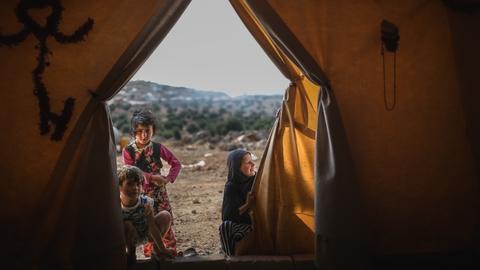[ad_1]

Now we have the data and means to feed everybody on the earth. Why don’t we?
Tonight, and each evening, 828 million folks will go to mattress hungry. An additional 49 million folks in 49 international locations teeter on famine’s edge. That’s simply the tip: 58 % of Africans, 41 % from Latin America and the Caribbean, 25 % of Asians, 13 % from Oceania, and eight % of Europeans and North People are food insecure –they’re unsure about what, how, and after they get to eat.
In the meantime, some 30 % of kids aged below 5 years are stunted, and lots of extra are poor in important nutritional vitamins and minerals. A 3rd of the ladies worldwide are anaemic. These are largely the signs and penalties of poverty.
Conversely, one billion persons are overweight, however a substantial proportion of them are additionally among the many poor. They go for energy-dense staples and low-cost fatty meals with minimal dietary worth as a result of a day by day nutritious diet consisting of two,100 balanced energy could be 5 instances extra expensive. The result’s explosive development in illnesses comparable to diabetes, cardiovascular and renal circumstances, and psychological well being dysfunctions. Now we have already learnt that overweight persons are thrice extra more likely to be hospitalised for Covid-19.
Our world has simply topped eight billion inhabitants, however some 4 billion are consuming too little or an excessive amount of or consuming the unsuitable stuff.
These are horrendous statistics, and the development has worsened, with the Food Price Index of the Meals and Agriculture Organisation (FAO) at present standing at 136, in comparison with 98 in 2020.
The Covid pandemic added to meals insecurity. However the true downside lies with the assorted armed conflicts, which have squeezed meals provides. One-third of all food-insecure persons are mired amidst the 130 conflicts raging worldwide as we undergo the harmful interval since World Struggle II. World grain provide disruption brought on by the Russia-Ukraine warfare supplies a stark illustration.
Future prospects are alarming due to the relentless development of local weather change. The worldwide warming restrict of 1.5 degrees Celsius is more and more infeasible, and planetary tipping factors comparable to glacier melting and sea degree rises are very probably. The devastating penalties for meals safety are exemplified by Pakistan’s floods, Somalia’s drought, and frequent, ferocious disasters elsewhere.
The short-term resolution is meals help. However the World Meals Programme will probably be fortunate to get two-thirds of the $20 billion looked for subsequent 12 months. And to get to ‘zero starvation’ by 2030, as per the Sustainable Improvement Objectives, it wants double that quantity. There’s an inevitable – and degrading – competitors between nations jostling on the Global Hunger Index. Who will get sufficient help this month, and who will starve?
Regardless of all the nice efforts of humanitarians to share restricted sources equitably, the inherent unfairness is self-evident in help preparations which are akin to a random lottery for all times depending on the unsure mercy of strangers.
We should do higher to cut back help dependency and create sustainable agrifood methods. Though this wants an eye-watering funding of $265 billion yearly, it’s not an inconceivable sum in a world economic system projected to achieve $110 trillion in 2023.
Right here’s what we are able to do to sort out this downside:
1- Make it a precedence
To begin with, states should method meals as a strategic matter – akin to nationwide defence – relatively than merely on growth or charitable concerns. These days, meals is usually used as a weapon of warfare and needs to be dealt with accordingly, even in peacetime. Which means, for instance, strategic meals reserves, meals intelligence capabilities, threats-and-risks analyses, and balanced insurance policies for meals resilience are based on nationally-determined standards and never globalised norms the place one measurement is meant to suit all.
2- Waste much less meals
Second, there may be an apparent profit to decreasing food wastage. At the moment, a 3rd of meals is misplaced and spoiled within the meals chain, amounting to 24 % of obtainable meals energy, costing $230 billion.
Aside from depleting pure sources, together with water and forests, meals waste generates 6 % of greenhouse gasoline emissions. Pests comparable to locusts and dangerous climate are partly accountable, however a lot is avoidable by way of client training and enchancment in how we retailer and transport meals.
3- Assist the small farmer
Third, small-scale farmers that produce 35 per cent of the world’s meals from simply 12 % of all agricultural land ought to get precedence adaptation funding to change into extra sustainably productive and resilient in opposition to local weather change. This could do greater than anything to create self-sufficiency and scale back dependency on meals imports within the huge client areas of China, South Asia, and sub-Saharan Africa.
4- Help native agro-ecosystem
Fourth, in lots of low-income nations which are meals help dependent, small companies round native meals manufacturing already contribute 70 % of the GDP. So, extra research and technological innovation might develop them in an eco-sensitive method that promotes biodiversity and improves soil and water methods, thereby enabling main productiveness positive aspects.
5- Develop it nearer to the market
Fifth, particular actions ought to deliver customers and producers geographically nearer to cut back “meals miles”, not simply to chop price and carbon footprint but in addition incorporate the training from Covid-19 administration that lengthy logistics chains enhance vulnerability to unreliable suppliers elsewhere.
Such proximity farming means larger urban agriculture. By 2050, two-thirds of us will stay in cities: why ought to meals not be produced there? Some applied sciences exist already for vertical farming and hydroponics. Greener city growth insurance policies might additionally scale back carbon emissions and make cities extra harmonious.
6- High quality over amount
Six, whereas the apparent issues of meals availability have been well-trained, high quality is usually ignored. The Global Dietary Database signifies that the worldwide dietary worth of what we eat is modest – scoring an mixture of 40 factors out of 100. Meals safety that optimises human growth isn’t just about amount but in addition high quality.
7- Diversify the meals basket
Seven, as there are limits to elevating the productiveness of in style crops, diversification is crucial. There are some 50,000 edible crops, however two-thirds of our energy come from simply three: wheat, maize, and rice. After all, dietary habits going again millennia are tough to vary, and our day by day bread or rice bowl has deep cultural that means.
However necessity dictates adaptation. Cassava, sorghum, millet, teff, and candy potatoes, for instance, are helpful substitutes and more healthy as a part of a various eating regimen. Below-utilised legumes and small grains may be extra local weather resilient by way of suitably-engineered seeds. A dietary revolution will probably be a central facet of constructing meals safety.
8-Consider higher methods to distribute help
Eight, even with full meals safety, meals help will probably be wanted for probably the most susceptible, particularly when catastrophe strikes. However transferring truckloads of major foodstuffs and bodily doling out rations to lengthy traces of ravenous folks is dear and inefficient. If markets are working as they largely do, even in disaster contexts, money is significantly better and these days conveniently out there in digital or voucher kinds. This provides recipients alternative and dignity of their hour of biggest want.
9- Make meals a part of the social safety web
9, higher nonetheless, could be to incorporate meals and vitamin entitlements inside common social safety methods not simply throughout regular instances however notably in instances of disaster. At the moment, lower than half the world’s inhabitants is roofed that means. International help – particularly meals– may very well be channelled by way of nationwide security nets.
10- Contain the personal sector
Lastly, all international locations ought to have multi-sectoral meals insurance policies and methods in pursuit of a typical nationwide mission, with sensible plans that contain the personal sector and different stakeholders.
Disclaimer: The viewpoints expressed by the authors don’t essentially replicate the opinions, viewpoints and editorial insurance policies of TRT World.
We welcome all pitches and submissions to TRT World Opinion – please ship them by way of electronic mail, to opinion.editorial@trtworld.com
Supply: TRT World
[ad_2]
Source link


